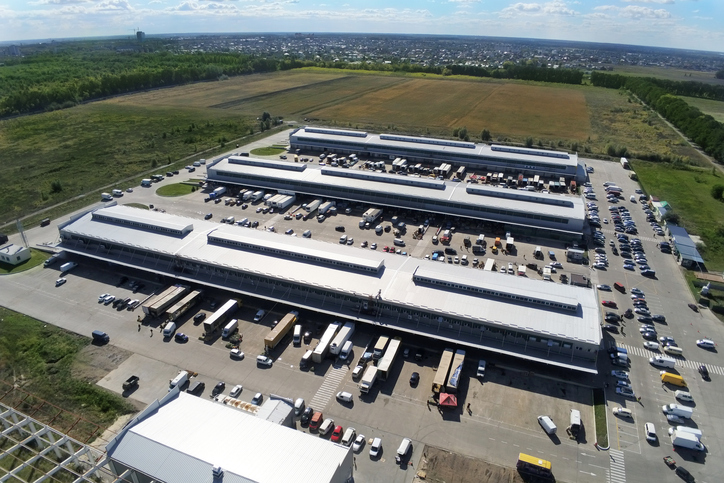ii view: Warehouse owner Segro ups the dividend
A dividend yield of around 2% and e-commerce trends amplified by the coronavirus.
5th August 2020 15:15
by Keith Bowman from interactive investor
A dividend yield of around 2% and e-commerce trends amplified by the coronavirus.

First-half results to 30 June
- Adjusted pre-tax profit up 6.5% to £140.4 million
- Adjusted Net Asset Value (NAV) per share up 2.6% to £7.18
- European measure - Net Asset Value (NAV) per share up 2.7% to £7.16
- Net debt up 1% to £2.51 billion from 31 December 2019
- Interim dividend per share up 9.5% to 6.9p
Chief executive David Sleath said:
"Segro's strong and resilient business has continued to grow in the first half of 2020 despite the unprecedented disruption caused by Covid-19, in no small part thanks to the dedication and commitment of our people.
"The impacts of the pandemic are accelerating the adoption of technology, particularly e-commerce, across society and have resulted in a renewed focus by many occupiers on the critical importance of efficient, resilient logistics supply chains. These factors play to the quality of our portfolio and should continue to support and enhance occupier and investor demand for our prime warehouses, both in the UK and, increasingly, on the Continent.”
ii round-up:
Warehouse and industrial property owner Segro (LSE:SGRO) continued to flag the favourable push which the Covid-19 pandemic had given to ecommerce and demand for logistical warehouses like its own.
New rental income of £33.7 million had been secured in the period, up from £33.3 million in the first of 2019, with profit adjusted for disposals rising by 6.5% to £140.4 million.
Segro shares gained more than 3% in afternoon UK trading and are up by 10% in the year-to-date. Shares of shop and office owners Land Securities (LSE:LAND) and British Land (LSE:BLND) are down around 40% in 2020. Segro is now the biggest real estate investment trust listed on the UK market. Its stock market value of over £11 billion is bigger than that of second and third biggest property companies Land Secs and British Land combined.
Segro owns or manages just over eight million square metres of space (88 million square feet). Around two-thirds of its portfolio is in urban warehouses. Its tenants include Sainsbury (LSE:SBRY), Amazon (NASDAQ:AMZN) and Tesco (LSE:TSCO)-owned Booker.
In contrast to both Land Securities and British Land, Segro has continued to pay a dividend, today announcing a near 10% increase over last year’s interim payment to 6.9p per share.
Marking its 100th birthday back in May, Sergo has furloughed no employees during the pandemic and has not required any government support measures.
Its near-term property development pipeline of just under half million square metres is already pre-let and is more than double the size of a year ago. It equates to around £33 million of rents.
In recent years Segro has been eyeing continental Europe. Management previously outlined its belief that e-commerce penetration in both France and Germany is now nearing the level at which retailers start to adapt their supply chains for an omni-channel delivery model.
A third-quarter trading update is scheduled for 21 October.
ii view:
Segro is underpinned by the structural themes of e-commerce and urbanisation driving occupier demand. The combination of its prime portfolio and its active approach to asset management lets it grow rents and maintain high occupancy levels across its markets. Covid-19, despite some prior tenant challenges, is underlining the importance of supply chains.
For investors, the group’s dividend paying abilities, emanating from its flow of rental payments, arguably provides the key attraction. A historic dividend yield of over 2% is not to be overlooked in the ongoing ultra-low interest rate world we now live in.
Potential growth in European e-commerce also offers attraction, although a current premium of the share price at around 986p over its half-year Net Asset Value per share of 718p suggests the shares are not at bargain basement levels and already attempting to price in future prospects.
Positives:
- Diversity of both customer or tenant type and geographical location
- Unlike some real estate investment trusts, it is still paying a dividend
Negatives:
- Some tenants have suffered Covid-19 disruption
- Valuation: trades at a premium to NAV
The average rating of stock market analysts:
‘Strong hold’
These articles are provided for information purposes only. Occasionally, an opinion about whether to buy or sell a specific investment may be provided by third parties. The content is not intended to be a personal recommendation to buy or sell any financial instrument or product, or to adopt any investment strategy as it is not provided based on an assessment of your investing knowledge and experience, your financial situation or your investment objectives. The value of your investments, and the income derived from them, may go down as well as up. You may not get back all the money that you invest. The investments referred to in this article may not be suitable for all investors, and if in doubt, an investor should seek advice from a qualified investment adviser.
Full performance can be found on the company or index summary page on the interactive investor website. Simply click on the company's or index name highlighted in the article.